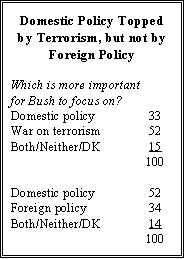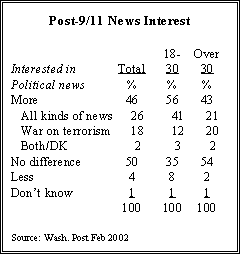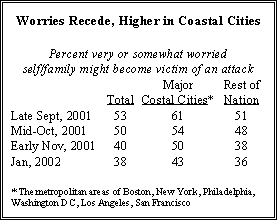
The events of September 11 have affected public opinion more dramatically than any event since World War II. Clearly the attacks brought unparalleled national unity, and patriotism, but perhaps more importantly and more enduringly, they have once again elevated the importance of nationhood. Washington, the federal government and even its political leadership have new relevance post-9/11.
To many Americans in the late 1990’s the national government, if not the nation-state itself, appeared irrelevant and or floundering. The seeming absence of an overseas threat to the country, the surging stock market driven by the emergence of a global Internet, and a policy emphasis on devolution to the states diminished the importance of the nation. Throughout the decade, Pew surveys found Americans saying that they were personally optimistic, but much less satisfaction and optimism was expressed about the nation. In Campaign 2000 nearly one-third of voters said that who’s elected president is not so important. The Sept. 11 attacks stopped these sentiments in their tracks.
Pew’s nationwide survey in January found twice as many Americans as in previous years thinking that the president’s State of the Union address would be especially important. And Gallup found the highest level of optimism about national progress since 1959, even as the public worried about national economic conditions.

The public’s trust in government, which was mired in the 30% range through much of the past decade, doubled in the wake of the attacks. That measure has since softened, but a CBS News/New York Times survey in January found 46% still saying they trust the government at least most of the time. Similarly, the president’s ratings continue at unprecedented levels, and the rising tide of opinion has been reflected in an improved opinion of Congress as well. In part, these changes are an expression of the country pulling together and thus appear likely to fade a bit over time. But they also reflect a clear awareness of the government’s new roles — to provide protection at home and wage war on enemies abroad. Several Pew Research Center surveys over the past few months underscore this theme. Support for increased defense spending stands at 60%, nearly triple the level of four years ago, while funding for terrorism defenses at home wins even more backing.
Interestingly, 9/11 has not caused the public to abandon its long-standing criticisms of government. A November survey by the Pew Research Center found more than half of respondents holding the view that government is too wasteful and controlling, with nearly as many expressing doubt about the trustworthiness of government officials. In fact, the dominant theme of the post-9/11 era is not that the public likes government more — rather it needs government more. This may slow a return to a hypercritical attitude toward government, even if feelings of national unity fade.
Politically, there are signs that the nation is returning to a more typical environment. Satisfaction with national conditions, while still high in historical terms, is slipping a bit. So are ratings for Congress and even President Bush. But the president is still rated positively by nearly eight-in-ten Americans and gets an extraordinary 63% approval mark among Democrats in Pew’s February survey. Tough congressional fights over energy, taxes and the deficit, and proposals to reform campaigns and elections could bring about a more partisan response.
The year’s most important political question is the extent to which Republicans can benefit from Bush’s lofty popularity. So far, there is little evidence that is occurring, and Pew recently found the two parties virtually tied in the generic congressional ballot.
9/11’s Lessons: Stay Involved, Stay Strong
While the 9/11 attacks gave Americans a renewed sense of nationhood, they also changed the way the public views the world. Rather than retreating to a position of increased defensiveness and isolationism, Americans have become more committed to U.S. involvement in the world, and to a multilateral approach to international affairs.
By nearly two-to-one (61%-32%), the public said in October that the best way to prevent future terrorism is to be active in world affairs. Americans also attach considerable importance to the views and desires of U.S. allies, so much so that more than half of those who favor the use of military force against Iraq say the United States should go ahead only if our allies agree.
The attacks also have affected public views of who are the United States’ friends and enemies. There has been a modest rise in sympathy for Israel, while public hostility toward China has decreased considerably since last year’s spy plane incident. A survey by Gallup in February also showed a sharp rise in the number expressing a favorable opinion of Russia, while the favorability of U.S. allies Saudi Arabia and Egypt has declined.
Yet perhaps the biggest lesson drawn by the public has been the need for greater military capability. In October, fully half of Americans said they wanted to see defense spending increased, up from 32% in early September, marking an all-time high since this question was first asked in 1974.
Equally significant, it is hard to recall a time during the post-World War II period when the public has been more willing to use military force abroad. Pew’s survey in January found solid majorities in favor of taking action against Iraq, Somalia and Sudan as part of the struggle against terrorism.

This new focus on terrorism may have narrowed the public’s foreign policy priorities. Efforts to stop the spread of AIDS and other infectious diseases, curb global warming and alleviate hunger are seen as less important in the wake of the attacks.
But there is no indication that the attacks, and the rising support for a stronger military, displaced the public’s focus on domestic policy priorities. In fact, roughly as many Americans think the federal government should increase spending on education, health care, and Medicare as say the same for spending on military and homeland defense. The majority of Americans, in short, want both guns and butter in the post-Sept. 11 environment, all the more reason that they look more favorably on government. When asked how to pay for increased defense spending, just 22% opt for reducing government’s role in other areas. Most favor either postponing or reducing last year’s tax cuts (42%) or allowing the government to add to the budget deficit (24%).
News More Important, Still Widely Ignored
The importance of nationhood also is seen in how the public views the importance of news from Washington. In November, fully two-thirds said they were generally more interested in the news than they were before the terrorist attacks, and in a February Washington Post poll, 46% said the events of Sept. 11 have made them more interested in politics and political news. For the past decade, majorities consistently said they were bored by what goes on in Washington; just 39% expressed this view in November.

Yet this sentiment has not been reflected in the public’s news habits. There is little evidence that the public is paying much more attention to non-terrorism news since the attacks. In the period from January to early September, 2001, an average of 27% of Americans followed a range of domestic news stories very closely. In the months since the attacks, this rose just three points, to 30%. By comparison, nearly seven-in-ten (69%) told us they were following news about terrorism in the United States very closely.

Similarly, attention to foreign news that is not about the war on terrorism has increased only marginally. Since Sept. 11, an average of 23% say they are following international news stories that are not war-related very closely, up from 16% in the first eight months of 2001. Compared to news about the U.S. war on terrorism in Afghanistan, which nearly half (49%) are following closely, interest in other international news remains relatively low.
The public’s lack of interest in non-war-related foreign news since Sept. 11 reflects a general distinction many make between traditional foreign policy and pursuing the war on terrorism. When asked whether the war on terrorism or domestic policy is more important, roughly half (52%) cite the war, while a third say domestic policy. However, when the choice is between foreign policy and domestic policy, these numbers are reversed, with only a third giving priority to foreign policy.
Youth Well-Intentioned, Still Inattentive

There is evidence that younger Americans in particular see government today as more relevant. In June, 2000, 56% of those under age 30 said they were generally bored by what goes on in Washington. In November of 2001, just 44% held this view. Moreover, 56% of those age 18-30 in a February Washington Post poll said the attacks made them more interested in political news, a significantly higher proportion than among older respondents.
Even more striking, fully 41% of these younger respondents said their increased interest was in all kinds of political news, not just news on the war on terrorism. This is nearly twice the proportion of those over age 30 (21%). And six-in-ten young respondents considered Bush’s latest State of the Union address to be more important than past years, compared with to 53% of those over age 30.
Despite this sense that national politics matter, there is no evidence that younger Americans are following domestic or international news, aside from news about terrorism, any closer than they were before the attacks. On average, just 21% of those under 30 have closely followed domestic news stories not related to terrorism since the attacks, unchanged from the period before Sept. 11. And the proportion following non-war international news also has remained steady among this group (13% prior to Sept. 11, 15% since).
Worry Gap Persists

The public’s worries over new acts of terrorism have subsided gradually since September. In January, fewer than four-in-ten (38%) expressed concern about themselves or their families becoming victims of terrorism, and just 12% said they were very worried. But since the attacks, there has been a “worry gap” between residents of major bicoastal cities and those living in the rest of the country. Although worries have decreased everywhere, this gap has persisted; in January, 43% of residents of major bicoastal cities expressed concerns about becoming a victim of terrorism, compared with 36% of those living elsewhere.




